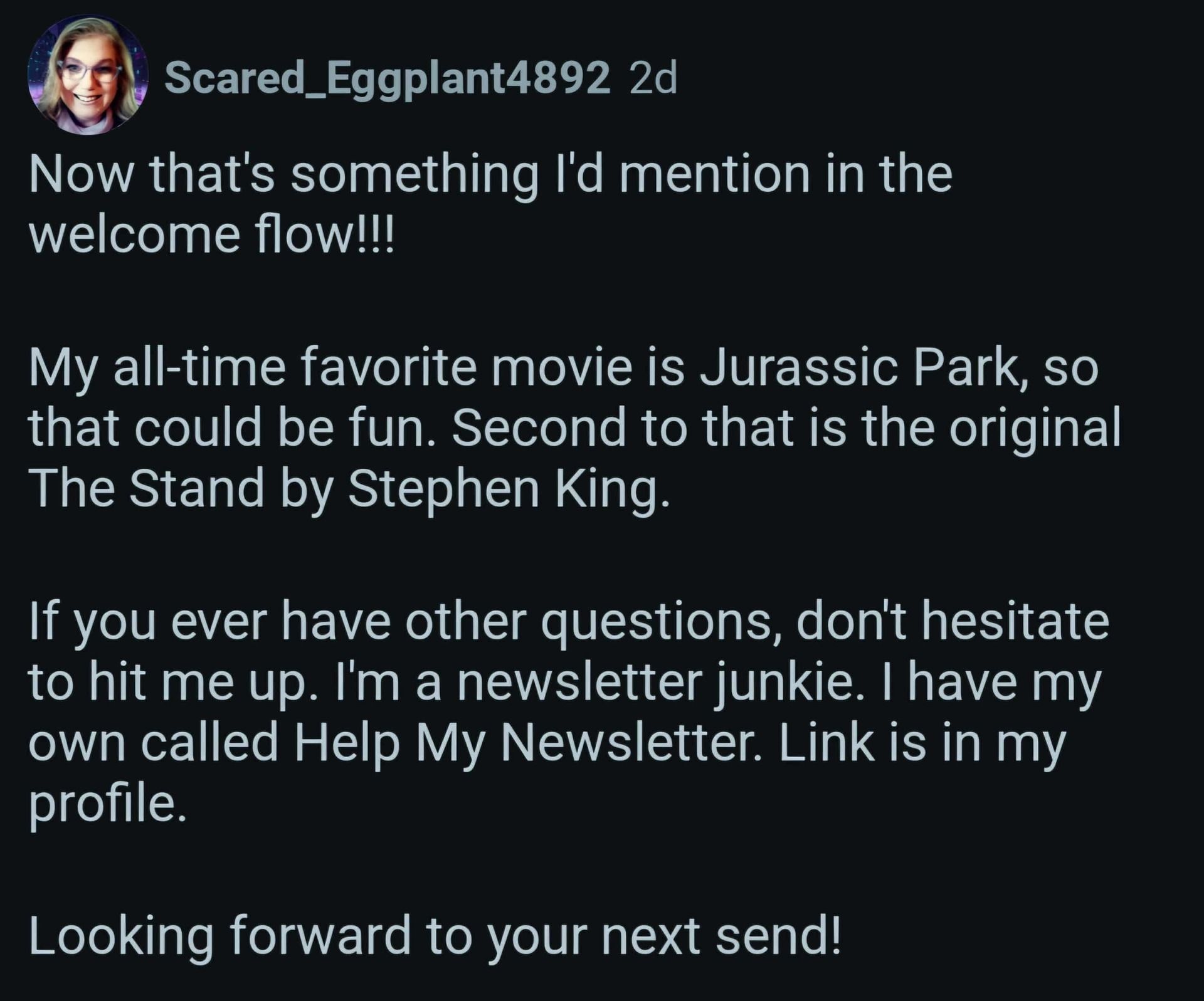
Hey Fanbased builder!
Three decades later, grown adults still get goosebumps hearing that iconic theme music. Jurassic Park didn't just make a movie - it rewired an entire generation's relationship with extinction. That's not storytelling. That's mass psychological programming. And you can steal their playbook for your emails.
🎬 What Got Me Completely Hooked
When I first watched Jurassic Park as a teenager. I realized when I was watching through our VCD, thinking I'd see some cool dinosaur effects. I was completely obsessed with paleontology, learning the names of the dinosaurs I discovered and spending hours trying to draw them. (even though I wasn’t any good at it haha)

What surprised me wasn't just the visual effects - it was how the movie made me care about creatures that died 65 million years ago. One moment I'm a normal kid, the next I'm memorizing Latin names of dinosaurs and correcting adults about the difference between Jurassic and Cretaceous periods.
📊 The Numbers Game
Viewership Impact: Jurassic Park grossed $1.03 billion worldwide and spawned a franchise worth over $6 billion. It's been seen by an estimated 1.8 billion people across all platforms.
Cultural Explosion: The movie single-handedly increased paleontology enrollment by 65% in the following decade. Museum dinosaur exhibit attendance jumped 40%. Google searches for "dinosaur facts" still spike whenever a Jurassic movie releases.
Fan Behavior: Adults still collect dinosaur toys, visit dig sites as vacation destinations, and debate Velociraptor intelligence in online forums. The movie created a multi-generational obsession that spans 30 years and shows no signs of slowing down.
🧠 THE PSYCHOLOGY BREAKDOWN
What Makes This Addictive
Jurassic Park weaponized our primal fear-fascination paradox. We're hardwired to be terrified of predators, but equally hardwired to be curious about the unknown. The movie feeds both drives simultaneously, creating an irresistible psychological cocktail.
Here's What's Really Happening in Your Brain
The film triggers what psychologists call "optimal arousal theory" - it keeps you in that perfect sweet spot between boredom and panic. Every scene balances wonder with terror, safety with danger. Your brain gets addicted to this emotional roller coaster because it mirrors our evolutionary survival patterns. The T-Rex paddock scene is literally designed to spike your stress hormones while keeping you cognitively engaged, creating the same neurochemical addiction that keeps people binge-watching series today.
📧 EMAIL PSYCHOLOGY SECRETS: STEAL THESE JURASSIC TECHNIQUES

The "Wonder-to-Terror" Emotional Rollercoaster
Start emails with fascinating, wonder-inducing content, then introduce the "predator" (problem/urgency). Like how Jurassic Park shows beautiful dinosaurs before revealing they're deadly. Example: "This marketing strategy is absolutely beautiful... and it's going to eat your competition alive."
The "Clever Girl" Surprise Reversal
Set up expectations, then flip them completely. The Velociraptors aren't just smart - they're smarter than humans. Your subject line: "Your customers are smarter than you think (here's proof)."
The "Life Finds a Way" Inevitability Principle
Present your solution as natural, unstoppable evolution. Not force, but inevitability. "Your email list will grow... because growth always finds a way. Here's how to guide it."
The "Spare No Expense" Value Stacking
Hammond spares no expense, then lists everything incredible about the park. Load your emails with value before asking for anything. Make readers feel like they're getting the premium experience.
The "Hold Onto Your Butts" Anticipation Builder
Samuel L. Jackson's line creates perfect anticipation. Use similar phrases: "Buckle up, this email is about to get wild" or "Hold tight, you're not ready for what's coming next."
The "Systems Failure" Urgency Creation
Everything fails at once in Jurassic Park, creating massive urgency. Stack multiple deadlines/scarcities in your emails: "Sale ends tomorrow + bonus disappears + only 50 spots left."
🎯 YOUR FANBASE ACTION PLAN
Just like Jurassic Park uses the wonder-to-terror emotional sequence to keep viewers glued to their seats, your next email should open with something fascinating before introducing the problem it solves. This week, implement the "Clever Girl" reversal technique in your subject lines and watch your open rates transform the same way Dr. Grant's understanding of Velociraptors transformed from "they're just lizards" to "they're systematic hunters with advanced intelligence."

Start with a commonly held belief, then reveal the surprising truth that changes everything. Your subscribers will feel that same "clever girl" moment of recognition that made Jurassic Park unforgettable.
🍿 WHERE TO STUDY THIS MASTERPIECE
Streaming Platforms:
HBO Max
Amazon Prime Video
Apple TV
Study Tips: Focus on the Brachiosaurus reveal scene (wonder creation) and the kitchen Velociraptor sequence (tension building). Watch how Spielberg uses pacing and reveals.
Research Angle: Notice how each dinosaur encounter follows the same psychological pattern: wonder → curiosity → concern → terror → relief. That's your email sequence template right there.
Thanks, Scared_Eggplant 4892 for suggesting Jurassic Park as our next featured movie!

💬 What Should I Decode Next?
What movie or series has completely hijacked your brain recently? Reply with your latest obsession and I'll break down the psychological manipulation tactics they're using on you (so you can steal them for your campaigns).
Until next week, remember: life finds a way... and so does great email marketing.
Stay obsessed, Geb Vence
P.S. The Research Backs This Up:
Recent research from Spiralytics found that emotional storytelling can lead to a 12% increase in purchase intent, while ads with above-average emotional responses result in 23% more sales than those lacking emotional engagement. The Jurassic Park psychological structure isn't just entertainment - it's proven conversion psychology.

